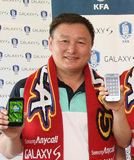Top Qs
Timeline
Chat
Perspective
Huh Jung-moo
South Korean footballer From Wikipedia, the free encyclopedia
Remove ads
Huh Jung-moo (Korean: 허정무; Hanja: 許丁茂; born 13 January 1955) is a former South Korean football player and manager.
Remove ads
Playing career
Summarize
Perspective
Huh was one of the best South Korean college footballers before starting his semi-professional career. He was often compared with Korea University's Cha Bum-kun while playing for Yonsei University. After his graduation, he joined Korea Electric Power FC, and simultaneously enlisted in Marine Corps and Navy FC to do mandatory military service.[3]
When Huh was discharged from the military service, European clubs were interested in Asian players due to Cha Bum-kun's performance in the Bundesliga. Motivated by Cha, Huh also wanted to play for a European club,[3] joining Eredivisie side PSV Eindhoven in August 1980.[4] He mainly played as a defensive midfielder and showed impressive form for three years. Johan Cruyff, who was tired from Huh's active marking, broke Huh's nose with his arm, and Willem van Hanegem showed a hysteria to Huh with the racist gesture "Slant-eye".
Huh went back to South Korea after the 1982–83 season. His wife felt homesick, and he also didn't feel the need to continue his life abroad after hearing the news that a professional league was founded in his country.[3][5] Huh joined Hyundai Horang-i as a founding member in 1984, and played for it for three years.
Huh was on the South Korea national team from 1974 to 1986, and won two gold medals in the Asian Games. He was also a member of Korean squad in the 1986 FIFA World Cup. In a group match against Argentina, he left a famous photo that he appeared to be kicking Diego Maradona whose face twisted with pain. Afterwards, he scored a goal against Italy.
Remove ads
Style of play
Huh was a versatile player, and could play in multiple positions. He was capable of playing as a striker, winger, attacking midfielder, defensive midfielder, or full-back. He covered great distance by utilising his competitive spirit and stamina. Because of his tough and energetic playing style, he was nicknamed "Jindogae", the hunter dog breed originated from his hometown Jindo Island. He was also adept at man marking and often duelled with Johan Cruyff in De Topper. He didn't have rapid pace, but he could dribble the ball with intelligent movement.[3]
Remove ads
Managerial career
Summarize
Perspective
Huh won the 1993 Korean League Cup with POSCO Atoms and the 1997 Korean FA Cup with Jeonnam Dragons before becoming permanent manager of South Korea national team in 1998.
At the national team, Huh picked some nameless young players and gave them important positions instead of established stars. His team was eliminated in the Asian Games quarter-finals and the CONCACAF Gold Cup group stage. His decision was not followed by good results at major competitions, inviting harsh criticism.[6] After finishing third at the 2000 AFC Asian Cup, he was replaced by Guus Hiddink.
Since Hiddink's incredible success in the 2002 FIFA World Cup, Korea Football Association (KFA) began hiring foreign managers, including Humberto Coelho, Jo Bonfrere, Dick Advocaat, and Pim Verbeek, but they failed to match Hiddink's success. Meanwhile, the nameless players picked by Huh became key players at the national team, especially Park Ji-sung and Lee Young-pyo who settled at the Premier League. The success of Huh's former apprentices in addition to his two victories with Jeonnam Dragons at the Korean FA Cup made him revalued as a candidate for the national team manager. Huh was appointed for the second time in December 2007 after leading candidates Mick McCarthy and Gérard Houllier both rejected the job. Huh got the team qualified for the 2010 FIFA World Cup without a loss at the qualifiers. In November 2009, he was named the AFC Coach of the Year after leading the national team to a 27-match unbeaten run. His team also advanced to the knockout stage at the 2010 World Cup.
In March 2013, Huh was appointed KFA's vice-president by president Chung Mong-gyu. On 10 July 2014, due to the national team's poor performance without a win at the 2014 FIFA World Cup, he resigned from the association along with national team manager Hong Myung-bo.[7]
After working as chairman of Daejeon Hana Citizen from 2020 to 2023,[8] Huh ran for KFA president in November 2024.[9] He was one of three candidates along with existing president Chung Mong-gyu and another challenger Shin Moon-seon, and lost to Chung in the election in February 2025.[10]
Remove ads
Career statistics
Club
- Appearance(s) in Korean National Championship
- Appearance(s) in Korean President's Cup
International
- Results list South Korea's goal tally first.
Remove ads
Honours
Player
Yonsei University
- Korean National Championship runner-up: 1974[14]
ROK Navy
Hyundai Horang-i
South Korea U20
- AFC Youth Championship third place: 1973, 1974[17]
South Korea
Individual
- Korean National Championship top goalscorer: 1974[14]
- Korean FA Best XI: 1974, 1977, 1978, 1979, 1984, 1985, 1986[19][20][21][22][23][24][25]
- Korean President's Cup Best Player: 1979[15]
- Korean FA Most Valuable Player: 1984[23]
- K League 1 Best XI: 1984[26]
- K League '80s All-Star Team: 2003[27]
Manager
POSCO Atoms
Jeonnam Dragons
- Korean FA Cup: 1997, 2006, 2007[16]
- Korean League Cup runner-up: 1997[16]
South Korea
- AFC Asian Cup third place: 2000[28]
- EAFF Championship: 2008[29]
Individual
- K League All-Star: 1995, 2005, 2006[30][31][32]
- Korean FA Cup Best Manager: 2006, 2007[33][34]
- AFC Coach of the Year: 2009[35]
Remove ads
References
External links
Wikiwand - on
Seamless Wikipedia browsing. On steroids.
Remove ads

